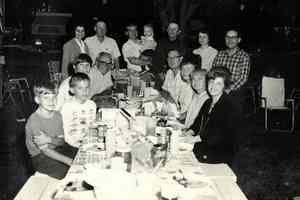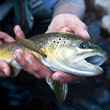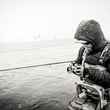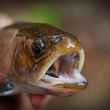It’s no secret that our piscatorial triumphs sound so much better in the telling if the heroic angler outsmarts a wily foe. So we embellish our trout with fishy superpowers like intelligence and emotional guile. Even when we lose them, we’re never beaten by a run-of-the-mill fish: It was big and arrogant and knew exactly what it was doing!’
I suspect it’s mostly male vanity that needs to prove its mettle in combat with a 12” fish, although with time most of us learn there isn’t a trout physically mighty enough for victory to transform us into warrior princes or princesses. So we also need clever fish to make us look good. Size isn’t everything. Is it?
And yet, type “think like a trout” into your search engine and admire the flood of results. They all agree: To catch a trout, we must first know its thoughts and so anticipate its deeds. In the telling of this eternal and epic struggle, we humans are always one step behind the fish. Trout, we are told, can outwit us.
This warning is intended to open our wallets because, back in the human world, trout-thinking sells. You can buy the books, subscribe to the podcasts and clickn’gift your data. It’s a thriving market that gets bigger every year. Enthusiasts dream of fluency, others monetize it, and a proud few say they learnt it from a parent.
This fish-think market is distinctly weird because, at some elemental level, all these anxious, charge-card wielding anglers are worried about being out-thought by a fish. Which, I hope you agree, is a very low bar.
So what might these devious fish be capable of? The irrepressible jazz maestro and fisherman George Melly set that bar high by extending a thinking trout’s repertoire into personal harassment. He attributed “a malicious sense of humour” to a large trout that he’d lost several times over a season, effectively granting it brains, cultural sophistication and serial bitchery. It’s fair to say that a fish armed with a malicious sense of humour would have met its match in George, who had a razor-sharp wit of his own. There’s also a very old adage that advises us never to let the facts get in the way of a good story. Perhaps some seriously-minded trout-thinkers have felt persecuted by a fish, but I’m sure George wasn’t one of them. Writer John Gierach has also made an astute observation: “The things fishermen know about trout aren’t facts but articles of faith”. I think he’s onto something.
Which, I suggest, is why trout-thinking is only ever found in people. Never trout. There are many good reasons why this is a skill too far for fish. Top of the list is that trout lack the sophisticated cerebral cortex we use for sentient thought. So although they’re not brain-dead, they’re brain-lite. They can learn from experience (hook / bad), but no trout has ever produced anything as clever as a conscious idea, let alone one intended to outwit us.
It gets worse. Fish brains are about 7 percent the mass of similarly sized birds (which do have a cerebral cortex). Chicken-thinking is, by comparison, classy and sophisticated. This is all rather awkward for the trout-thinkers: If they’re struggling with a fish, they’re going to be humiliated by a chicken.
Thanks to neuroscience we know trout are hard-wired to feed reflexively, just as they do most things reflexively. So we are told they are primarily triggered to take a fly by its shape, size and position/movement in the water. They don’t think about it, they just get on with it.
Then there is the fierce competition from other fish. Survival dictates that trout eat first and ask questions later (for the trout-thinkers, that’s a metaphor). Perhaps they have a bit more reaction time in stillwaters than rivers, but in both settings this urge to get there first works in our favor. We’ve all seen a fish surge a couple of meters to snatch a fly. So if the trout are feeding freely and we’re not catching any, it’s not because they’re being capricious. Clearly, something else is going on.
This something is most likely us, the human with a rod in its hand. That and Murphy’s Law (if a thing can go wrong, it will). Happily, we have our own super-power: We can think like a human. So, we can read the river and the weather. We can choose a fly to resemble those on the water or even something stand-out different. We can consider colour, smell and sound. Or sunlight, shade, water temperature and more, all of which may set off different hard-wired feeding patterns. As can a fish’s lateral line.
Next comes by far the most important part. We must apply all our skill, knowledge and experience to put the fly in the right place on or in the water. Once there the way it moves can also seduce or repel fish. It’s not easy, perfection is unattainable and there will always be fish we can’t catch. And when we fail it’s a very lame excuse to blame a scheming trout.
We humans have opposing thumbs for casting and a huge brain-powered edge over trout. Dumbing down and projecting trout-think onto a fish won’t impress it, although it’s pretty good at hooking humans.
Perhaps we could stop pretending that trout see themselves as fey schemers intent on frustrating our noble designs. Heck, they don’t even know they’re fish. Our ancestors emerged onto land about 400 million years ago and fish have a lot of catching up to do. So do some people.






























Comments